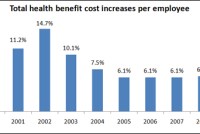Latest KFF Health News Stories
Health Care Model Faces Hurdles On Quality and Cost
If President Obama succeeds in slowing the growth of health care spending, it will be with some of the innovative services and procedures being used as part of a pilot project in Annapolis, Md.
Experts cite a disturbing trend in the acceleration of medical spending in areas like Provo, Utah, once noted for lower costs.
Text: The Obama Administration’s New ‘Patient’s Bill Of Rights’
The White House today released a “Fact Sheet: The Affordable Care Act’s New Patient’s Bill of Rights,” the Obama administration’s summary of new regulations issued by the Department of Health and Human Services.
Rising Costs Spur Increase In Health Savings Accounts
High deductible health plans and the associated health saving accounts that allow people to put aside money tax-free to cover medical expenses get mixed reviews from many consumers. But supporters of the plans worry that the health overhaul may hamper their use.
New Survey: Consumers Who Buy Their Own Health Insurance Report Big Rate Increase Requests
When the big California health insurer Wellpoint sought rate increases up to 39 percent this year, some wondered if they were unusual. But in a new national survey consumers who buy their own policies report the most recent rate requests averaged 20 percent.
Market-Based Reform Initiatives Are Key To Health Law Success
Consumer-directed health plans have been useful in controlling the rise of health costs over the last several years, but the survival of these plans is threatened by the new health overhaul law.
Rising Health Care Costs Pose Challenge For Democrats In Election Year
After the bitter battle to get the Patient Protection and Affordable Care Act passed, Democrats are on the defensive amid an expected increase in Americans’ health care costs.
Medicare Advantage: You Get What You Pay For
In the long run, there’s no getting around the fact that Advantage plans will shrink in generosity and availability. Anything else would defy a fundamental law of economics that also happens to be a fundamental law of politics: you get what you pay for. And that might not be a bad thing.
Administration officials tout the Medicare drug rebate as an early and tangible benefit of health reform while Senate Democrats continue trying to advance a legislative package that includes the Medicare physician payment fix and, potentially, an extension of enhanced Medicaid funding for states.
The Health Care Economy: New Questions About Costs, Quality And Care
The health care industry is bulletproof when it comes to increasing spending or creating jobs as growth rates often double the rest of the economy.
Controversy erupted this week after the director of the Congressional Budget Office said the new health overhaul law won’t significantly reduce government speding on health care and a New York Times story critiqued Dartmouth research on health spending.
Much of this week’s major health policy news stems directly from Congress’ unfinished business related to the Medicare ‘doc fix’ as well as the House Democrats’ decision not to include enhanced Medicaid funding and COBRA benefit subsidies in their sweeping jobs bill.
COBRA Subsidy Starts Running Out For Some As Congress Grapples With Extension
The proposal to extend COBRA subsidies to those laid off through the end of the year is languishing in Congress. So the unemployed may soon pay more to remain on COBRA, look for insurance on the individual market, go on Medicaid or lose coverage altogether. And that could further tax a health system already struggling to keep up with the number of uninsured.
Patient Survey: More Health Care Is Better, Despite What Experts Say
A new survey finds that, when it comes to their own health care, most people say “more is better, newer is better, you get what you pay for.” That’s frustrating for experts who say these things are often not true.
Analysis: Anti-Smoking Program Extinguished in New Jersey
Gov. Chris Christie is cutting services and New Jersey’s anti-smoking program in order to reduce the deficit. Other states are feeling the pinch as well.
What The New Health Law Means For You
The law will extend health insurance to 32 million currently uninsured Americans by 2019, and will also have an impact on how nearly every American buys insurance and what insurance must cover.
Insurance Industry Faces Tough Scrutiny From Federal Watchdogs
A foursome of longtime industry watchdogs are helping steer the federal government’s effort to overhaul the private insurance market. Karen Pollitz, Steve Larsen, Jay Angoff and Richard Popper have top spots in the newly minted Office of Consumer Information and Insurance Oversight.
Health Care Tax Credit Comes With Benefits, Strings For Small Businesses
Michelle Andrews’ latest consumer column explores the health care tax credit for small businesses, which is designed to help employers pay for insuring workers. But the credit has several conditions, and some are worried that it won’t provide enough help.
The Decline Of Employer-Sponsored Coverage Under Health Reform: Good, Bad Or Ugly?
The new health overhaul law will encourage employers to stop offering health insurance. We should welcome this, provided the decline in employer coverage is gradual and good alternatives exist. The upside is that it will make more visible the biggest looming health care problem: costs.
Experts Worry: Could Government Loans To Doctors Raise Health Costs?
More than $2.5 billion in government-backed loans to doctors, dentists and other health care providers is helping to stimulate the economy and help patients, but some health experts say the money could increase health costs.












